Getting a new tattoo is always exciting, but it also comes with a responsibility to take care of it properly. While caring for your tattoo during the day is often discussed, it is equally important to take care of it at night. When you get a new tattoo, it will go through a healing process, and putting the wrong things on it could be detrimental to its healing. In this article, we will discuss what you need to know about caring for your new tattoo at night, including what to put on a new tattoo at night to speed up the healing process.
Contents
What to Put on a New Tattoo at Night
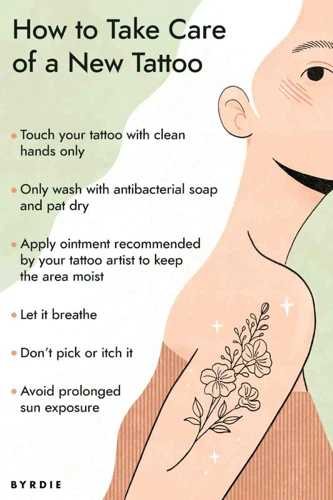
Taking care of your new tattoo is important for the healing process, especially at night when you are asleep. During your sleep, your movements can irritate your tattoo and result in slower healing. Here is a list of things to consider putting on your new tattoo at night to ensure it remains clean, moisturized, and protected.
| Product | How to Use |
|---|---|
| Non-stick bandage or wrap | Wrap your tattoo with a non-stick bandage or wrap before going to bed. It provides a barrier against friction and protects your tattoo from clothing or bed sheets rubbing against it. However, if you choose to use a wrap, don’t use it for more than 2-3 nights as it can trap moisture. |
| Fragrance-free lotion or ointment | After washing your tattoo before bed, pat it dry with a clean towel and apply a thin layer of fragrance-free lotion or ointment. Do not over-apply as it can clog pores and slows the healing process. Aloe vera lotion or coconut oil are good choices as they have anti-inflammatory and anti-bacterial agents. |
| Antibacterial soap | Use a mild, fragrance-free and antibacterial soap to gently wash your tattoo after a day of activities. Avoid hot showers or bath as it may affect the ink’s longevity and irritate your tattoo. Blot dry the tattoo with a clean towel before applying a moisturizer. |
Note: Do not use an ointment that contains petrolatum on a new tattoo as it can clog pores and may delay healing. Also, do not scratch or pick at your tattoo, and avoid tight-fitting clothing as it can rub against your tattoo.
In summary, knowing what to put on a new tattoo at night is essential for proper healing. Using a non-stick bandage or wrap, fragrance-free lotion or ointment, and a mild antibacterial soap can keep your tattoo clean, moisturized, and protected. Make sure to follow proper aftercare instructions throughout the healing process, including what to do with a new tattoo at night to maintain its durability and longevity.
Clean the Area
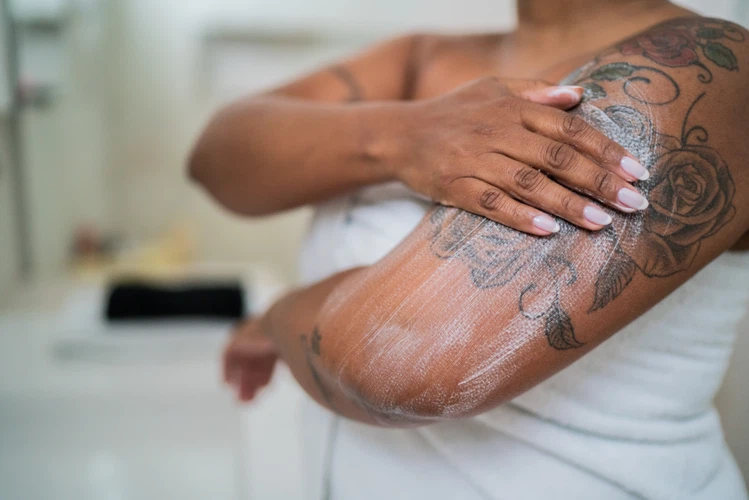
After getting a new tattoo, it is crucial to keep the area spotlessly clean to prevent infections or other complications. Clean the tattooed area at night before going to bed using lukewarm water and mild fragrance-free soap.
| DO | DON’T |
|---|---|
| Wash your hands thoroughly with soap to prevent germs from transferring to the tattoo. | Do not use hot water, as it can damage the tattooed skin. |
| Gently wash the tattooed area for 15-20 seconds with the soap, making sure to remove all excess blood, plasma, or ink. | Do not scrub the tattooed area roughly or use a washcloth or sponge. It can irritate the skin and cause bleeding. |
| Rinse the area with lukewarm water until all traces of the soap have been removed. | Do not soak or submerge the tattoo in water. It can damage the artwork or cause infection. |
| Pat dry the area with a clean towel or paper towels. | Do not rub or scratch the tattooed area. It can cause scabbing, peeling, and damage to the artwork. |
| Apply a thin layer of fragrance-free moisturizer or ointment to keep the skin hydrated and speed up the healing process. | Do not apply too much moisturizer or ointment. It can cause the tattoo to suffocate, delay the healing process or cause an allergic reaction. |
Cleaning your tattoo regularly is a vital part of caring for your new tattoo, especially at night. Follow these essential Dos and Don’ts to maintain your tattoo and promote quick healing.
Apply a Thin Layer of Ointment
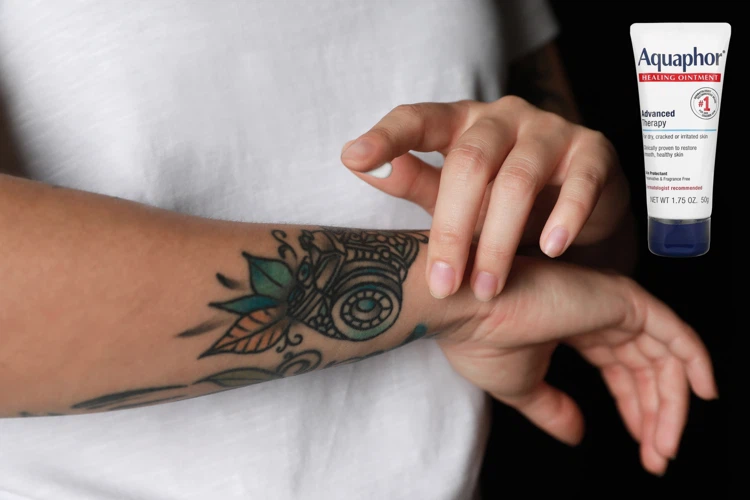
After cleaning and drying your tattoo, it’s important to apply a thin layer of ointment to keep it moisturized and protected. Here are some tips to keep in mind:
- Make sure your hands are clean before applying the ointment.
- Use a clean cotton swab or your fingertips to apply the ointment.
- Rotate the area of the ointment application by massaging it into the skin with gentle circular motions.
- Do not apply too much ointment as it can suffocate the tattoo and lead to infections.
- Choose a high-quality, fragrance-free ointment like Aquaphor, A&D, or a tattoo-specific aftercare product recommended by your tattoo artist.
- Avoid petroleum-based products as they can cause your tattoo to fade.
- Apply the ointment 2-3 times a day, depending on your artist’s instructions, until the tattoo is fully healed.
- After applying the ointment, be sure to wash your hands properly.
Remember, over-caring for a tattoo can be just as harmful as not caring for it at all. Follow the aftercare instructions given by your tattoo artist and monitor your tattoo for any signs of infection or reaction.
Cover the Area With a Bandage
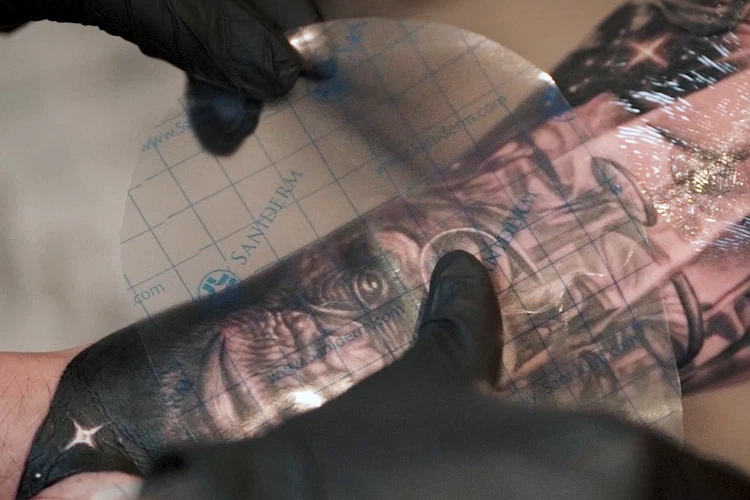
Covering your fresh tattoo with a bandage is an essential step in the aftercare process to avoid any bacteria or unwanted substances from getting into your skin. After washing your tattoo, carefully pat it dry with a clean towel then apply a thin layer of an ointment recommended by your tattoo artist. After that, take a non-stick bandage and cover the tattooed area gently, making sure to avoid any wrinkling or creases.
The bandage should be changed daily to avoid any buildup of fluids, and the area should be gently cleaned before re-applying another bandage. It is essential to avoid wrapping the bandage too tightly as it could cut off circulation, and this would cause further harm to the newly-tattooed skin.
Covering your tattoo with a bandage protects it from rubbing against clothes, which could irritate the area and slow down the healing process. If your tattoo artist advises leaving the bandage on for more than a day, ensure you follow those instructions.
In summary, covering your fresh tattoo with a bandage is a crucial step in the aftercare process. It helps protect the area from bacteria and other unwanted substances while also ensuring faster healing. Remember to clean the area before re-applying a new bandage and to avoid wrapping it too tightly.
What to Do With a New Tattoo at Night

Getting a new tattoo is exciting, but it’s also important to take proper care of your tattoo to ensure it heals properly. Caring for your tattoo at night is particularly important, as this is the time when you are most likely to sleep in a position that can irritate your new ink. In this article, we’ll cover the important steps you should take to care for your new tattoo at night.
| Step | What to Do |
|---|---|
| 1 | Clean your tattoo before bed. |
| 2 | Apply a thin layer of unscented, alcohol-free moisturizer. |
| 3 | Avoid applying too much moisturizer or covering your tattoo with tight clothing or bedding. |
| 4 | Protect your tattoo from rubbing or irritation by sleeping on a clean, soft surface. |
| 5 | Avoid direct contact with pets or children to prevent accidental rubbing or scratching. |
| 6 | Keep your tattoo out of direct sunlight during the healing process. |
| 7 | Avoid submerging your tattoo in water, such as in a bath or swimming pool. |
By following these steps, you can help ensure that your new tattoo heals properly and looks great for years to come. Remember to care for your tattoo throughout the healing process by keeping it clean, moisturized, and protected from irritation.
Avoid Direct Contact With Sunlight
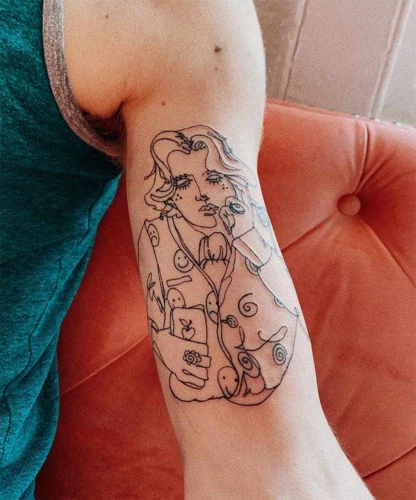
- Direct sunlight can cause your tattoo to fade quickly, and damage the quality of the ink
- Ultraviolet rays from the sun can also irritate and dry out your skin, which can lengthen the healing process and increase the risk of infection
- Protect your tattoo from sunlight by wearing loose clothing that covers the area or applying a layer of sunscreen with a high SPF rating before going outside
- Make sure to reapply sunscreen every couple of hours, especially if you are in direct sunlight for an extended period of time
- If possible, avoid direct sunlight altogether for the first few weeks after getting your new tattoo to ensure long-lasting and vibrant ink
Remember, the healing process for a new tattoo can take several weeks, and it’s important to care for it properly to ensure the best results. One of the most critical things you can do is to avoid direct contact with the sunlight. Keep these tips in mind and take extra precautions to protect your new tattoo from the sun’s harsh rays. By doing so, you’ll help ensure that your tattoo will look great for years to come!
Avoid Swimming or Bathing
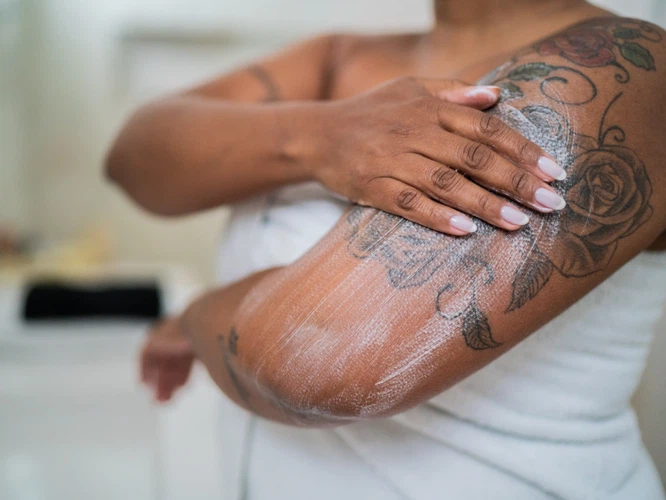
Avoid swimming or taking a bath for at least two weeks after getting your new tattoo. Water can damage your tattoo and irritate your skin, making it more susceptible to infections.
| Do’s | Don’ts |
|---|---|
| Use a mild non-scented soap when showering | Soak your tattoo in water |
| Pat dry gently with a clean towel or air-dry it | Rub or scratch your tattoo while drying |
| Apply a thin layer of Tattoo aftercare ointment after drying | Expose your tattoo to direct sunlight or tanning beds |
| Wear loose-fitting clothing that won’t stick to your tattoo | Wear tight clothing over your new tattoo |
It’s important to avoid swimming, as chlorine and saltwater can cause irritation and dryness to your skin, which may lead to peeling and fading of your new tattoo. Bathing in unsanitary conditions can also be harmful to your new tattoo, as it can lead to acquiring bacteria and infections. Keep your tattoo clean and dry, and watch out for any signs of infection, such as redness, swelling, and discharge.
During the healing process, your new tattoo is like an open wound, so it’s essential to take care of it properly. Follow your tattoo artist’s aftercare instructions, and avoid swimming or bathing for at least two weeks.
Avoid Tight Clothing
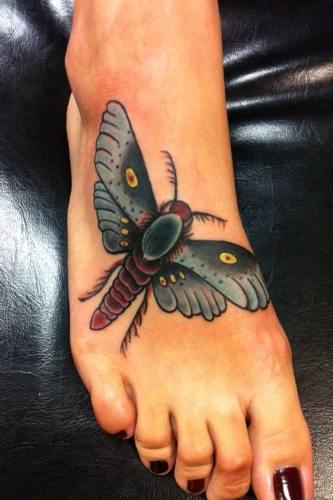
After getting a new tattoo, it’s essential to take care of it to prevent infections and ensure it heals correctly. Proper care includes avoiding tight clothing, especially at night, when you might have less control over the position you sleep. Tight clothing can rub against the tattoo, leading to irritation, and in severe cases, infection.
Here’s why you should avoid tight clothing after getting a new tattoo:
| Why? | What to do instead? |
|---|---|
| Tight clothing can irritate your new tattoo. | Choose loose, breathable clothing that doesn’t rub against the tattoo at night. |
| Tight clothing can cause sweating, leading to the buildup of bacteria around your new tattoo. | Avoid synthetic materials that trap heat and humidity; opt for cotton, which is breathable and soft on the skin. |
| Tight clothing impedes blood flow to the tattooed area, which is essential for proper healing. | Wear loose pajamas, shorts, or a gown to bed; this will promote blood flow, reduce irritation, and speed up the healing process. |
Remember, what you put on a new tattoo at night is as crucial as what you do with it during the day. Protect your tattoo by avoiding tight clothes, especially when sleeping. Choose comfortable and breathable clothing that won’t rub against the tattoo and cause irritation. In case you experience pain, seek medical advice from a qualified professional.
Keep the Area Clean

Caring for your new tattoo is crucial if you want to keep it looking flawless. One of the most important aspects of caring for a new tattoo is keeping the area clean. Here are some interesting facts about why keeping a new tattoo clean is so essential:
- When you get a tattoo, your skin has essentially been punctured thousands of times by a needle. This creates tiny wounds that are susceptible to infection.
- Infections can cause serious damage to your tattoo and even lead to scarring. In some cases, they can even become life-threatening.
- One of the easiest ways to prevent infection is by keeping the area clean. This means washing it regularly and keeping it dry.
- When washing your tattoo, it’s important to use a mild, fragrance-free soap and warm water. Be gentle when washing your tattoo and avoid scrubbing it too hard.
- After washing your tattoo, it’s important to pat it dry with a clean towel or paper towel. Don’t rub it, as this can cause irritation.
- It’s also important to avoid touching your new tattoo as much as possible. Your hands can introduce harmful bacteria to the area, increasing the risk of infection.
- If you need to touch your tattoo, make sure to wash your hands thoroughly first.
Remember, what you put on your new tattoo at night and what you do with it can have a significant impact on how well it heals. By keeping the area clean and taking proper care of your tattoo, you can ensure that it looks great for years to come.
Avoid Re-Applying Ointment Too Often
Proper aftercare is crucial to ensure your tattoo heals properly, and a significant part of that is applying skin ointment. However, applying too much of it can be harmful.
Although you might think that applying ointment in large amounts will help your tattoo heal faster, it’s not the case. Overuse of ointment can lead to clogging of the pores and slow down the healing process. Applying too much ointment can also cause skin irritation, itchiness, or even an allergic reaction.
You should apply a thin layer of ointment on your tattoo before going to bed. You may also want to wrap your tattoo with a non-stick bandage to prevent the ink from rubbing off on your bed sheets. Be sure to wash your tattoo with warm water and mild soap in the morning to avoid a build-up of excess ointment.
| Do’s | Dont’s |
|---|---|
|
|
Using a mild skin ointment during the healing process can help protect your tattoo, reduce itchiness and irritation. Choose a product that is free of harsh chemicals and fragrances that can irritate your skin. If you’re unsure what to put on a new tattoo at night, consult your tattoo artist for advice.
Remember, taking proper care of your new tattoo is essential for its longevity and appearance. Be patient, follow proper aftercare procedures, and avoid re-applying ointment too often, and you’ll have a beautiful piece of body art that you can enjoy for years to come.
Frequently Asked Questions
What type of bandage should I use to cover my new tattoo at night?
It is crucial to keep your new tattoo covered and protected at night to prevent it from sticking to your sheets or clothing. A non-stick, sterile, and hypoallergenic bandage is the best choice for covering your tattoo. Look for a bandage that is large enough to cover the entire tattoo, without being too tight or restrictive. Additionally, avoid using waterproof or adhesive bandages as they can damage your new tattoo and hinder the healing process. Opt for a breathable and lightweight option that allows your skin to breathe and heal properly. Remember to change the bandage regularly and follow your tattoo artist’s aftercare instructions for optimal healing.
How often should I apply a new bandage to my tattoo at night?
It is recommended that you change your bandage every night before going to bed. This is important to keep your new tattoo clean and prevent any bacteria from entering the tattooed area. When changing your bandage, make sure to clean the area with mild soap and warm water before applying a new bandage. Additionally, make sure the new bandage is large enough to cover the entire tattooed area and does not stick to the tattoo. It is also important to make sure the bandage is not too tight, as this can cause irritation and hinder the healing process. Repeat this process every night until your tattoo is fully healed.
How long should I keep my new tattoo bandaged at night?
It is recommended to keep your new tattoo bandaged at night for the first 2-3 nights. This will help protect your tattoo from rubbing against your sheets or clothing and prevent bacteria from getting into the open wound. After 2-3 nights, you should remove the bandage and allow your tattoo to breathe. It’s crucial to note that leaving a bandage on for too long can result in excess moisture, which can lead to infection. Always follow your tattoo artist’s aftercare instructions and consult with them if you have any concerns.
How should I clean my new tattoo at night?
Cleaning your new tattoo at night is crucial to ensuring it heals properly. Here are the steps to follow:
1. Wash your hands thoroughly with soap and warm water.
2. Gently remove any dressing or wrap from your tattoo. Do this carefully to avoid disrupting any scabs or crusts that may have formed.
3. Using lukewarm water and fragrance-free soap, gently wash your tattoo with your fingertips. Avoid using a washcloth, sponge, or loofah as they can irritate the skin.
4. Rinse your tattoo thoroughly with cool water to remove any soap residue.
5. Pat your tattoo dry with a clean towel. Do not rub your tattoo as this can cause irritation or damage the skin.
6. Once your tattoo is completely dry, apply a thin layer of tattoo aftercare ointment or lotion. Gently massage the ointment into your skin.
7. Cover your tattoo with a clean, breathable dressing, if necessary.
Remember to always follow your tattoo artist’s aftercare instructions and avoid submerging your tattoo in water or exposing it to direct sunlight during the healing process.
Are there any special instructions for caring for a new tattoo at night?
Caring for a new tattoo requires attention and caution both during the day and at night. However, there are some special instructions that you should follow specifically for the night-time care of your new tattoo. Here are some tips to help you protect and heal your tattoo through the night.
- Clean your tattoo before bedtime – You should clean your tattoo before going to bed to remove any dirt, sweat, or bacteria that may have accumulated on it throughout the day. Use a gentle, fragrance-free soap and lukewarm water to wash the tattooed area. Pat dry the tattoo with a clean towel, avoiding any rough rubbing.
- Avoid wearing tight or restrictive clothing – Wearing tight or restrictive clothing can irritate your new tattoo and slow down the healing process. So, it’s best to wear loose and comfortable clothing to bed that allows your tattoo to breathe.
- Choose the right bedding – It is important to choose bedding that is clean and soft for your new tattoo. Opt for soft, breathable materials, such as cotton, to avoid any irritation and discomfort. Additionally, you may want to consider sleeping on your side or back to avoid rubbing the tattoo against your bedding.
- Apply a thin layer of moisturizer – Moisturizing your fresh tattoo is essential to help it heal correctly. Before going to bed, apply a thin layer of fragrance-free, non-petroleum-based moisturizer on your tattoo to prevent it from drying out overnight. Avoid over-moisturizing, as this can lead to infections or clogged pores.
- Keep your tattoo covered if needed – If your tattoo artist has recommended covering your new tattoo while sleeping, then make sure you follow their instructions. Use a sterile, breathable covering, such as sterile gauze, to keep your tattoo protected and clean while you sleep.
Following these special instructions for caring for your new tattoo at night will help it heal quickly and smoothly. Remember, your tattoo will take time to heal properly, and you should never rush the process. Avoid exposing it to excessive heat, moisture or the sun, and always follow the aftercare instructions given to you by your tattoo artist.
Conclusion
Caring for a new tattoo at night is essential to ensure proper healing and the best possible outcome. Keep the area clean by washing it with a mild soap, applying a thin layer of ointment, and wearing clean and breathable clothing. Protect the tattoo from sun exposure and practice proper hygiene to reduce the risk of infection. Following these tips will help ensure your tattoo looks its best for years to come.